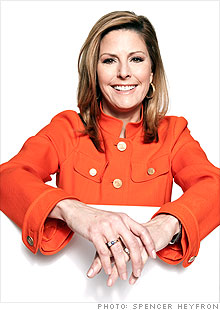Search News
(Fortune) -- Even with the Democrats playing defense as President Obama enters his second year in office, his Republican opponents face a fundamental problem going into the midterm elections: How do they champion a vibrant free market?
It's a more prickly question than party leaders want to admit. Robust free enterprise is hardly a slam-dunk cause with voters right now. Public anger over taxpayer bailouts of Wall Street and Detroit is the common thread that runs through the tea party movement and the vivid disdain for Washington that shows up among more traditional voters in both parties.
 |
| Nina Easton, senior editor at large |
For Republicans the question has to be asked, If the free market works, how did a huge swath of it fall into the hands of the federal government?
Indeed, as many GOP incumbents get ready to hit the campaign trail, they are trying to figure out how best to explain their support of TARP, the $700 billion rescue package. A deeper conversation is mostly still confined to the scholars who populate idea-producing journals and think tanks. In recent months they've churned out works with titles like After the Fall: Saving Capitalism From Wall Street And Washington (a book by the Manhattan Institute's Nicole Gelinas) and Recovering the Case for Capitalism (a speech by National Interest editor Yuval Levin).
Their arguments -- from Levin's plea for a return to old-fashioned market values like diligence and frugality to Gelinas's urging that the system be cleansed of implicit government guarantees that cushion risk takers -- are not easily translated into election-year stump speeches, but some lawmakers are trying.
Most notable is Rep. Paul Ryan, the Wisconsin wonk who has emerged as the House Republicans' go-to ideas guy. Borrowing from University of Chicago economist Luigi Zingales, Ryan distinguishes being pro-market (a good thing) from being pro-business (not a good thing).
As Zingales puts it in his own capitalism-after-the-crisis treatise, keeping markets free means maintaining an open and level playing field. But, he adds, Washington's pro-business lobbyists work to corrupt a fair system by persuading Congress to tilt the balance in favor of their own industries.
Fairness might be a good place to start if Republicans want to find the inner capitalist in voters angry at big business. Americans instinctively favor free markets.
As Zingales writes, "Until recently Americans stood out for their acceptance of basic market principles and even for their tolerance of some of the negative side effects, such as marked income inequality." In other words, the class warfare rhetoric coming out of middle America is pretty atypical in modern times. Most Americans haven't minded seeing the other guy get wildly rich as long as they felt they had their own opportunities to succeed.
What also appeals to Americans are calls to inject fairness back into the marketplace. Today's taxpayer-funded backstops suggest a market that is tilted toward the survival of the big, wealthy, and powerful.
Public-opinion scholar Michael Barone argues that Americans like social programs -- such as veterans benefits and Social Security -- when effort and reward are linked. You can make the same argument about capitalism: Americans support sensibly regulated markets where opportunity -- and failure -- is afforded everyone.
The most thoughtful Republicans get this. Lawmakers like Tennessee Sen. Bob Corker want to shape reforms that will end the idea that any company -- from GM in Detroit to AIG (AIG, Fortune 500) on Wall Street to Fannie Mae (FNM, Fortune 500) in Washington -- is too big and far-reaching to fail without taking the economy down with it.
Green-eyeshade issues like reforming a regulatory system that brought the economy to near collapse have taken a back seat to partisan passions over health care. But that's a banner that free-market-minded politicians need to carry this election year. As Gelinas writes, "Bad companies ... must be allowed to fail so that their bad ideas can have a chance of dying with them."
Somewhere in those words are the beginnings of a compelling campaign slogan. ![]()






| Company | Price | Change | % Change |
|---|---|---|---|
| Ford Motor Co | 8.29 | 0.05 | 0.61% |
| Advanced Micro Devic... | 54.59 | 0.70 | 1.30% |
| Cisco Systems Inc | 47.49 | -2.44 | -4.89% |
| General Electric Co | 13.00 | -0.16 | -1.22% |
| Kraft Heinz Co | 27.84 | -2.20 | -7.32% |
| Index | Last | Change | % Change |
|---|---|---|---|
| Dow | 32,627.97 | -234.33 | -0.71% |
| Nasdaq | 13,215.24 | 99.07 | 0.76% |
| S&P 500 | 3,913.10 | -2.36 | -0.06% |
| Treasuries | 1.73 | 0.00 | 0.12% |
|
Bankrupt toy retailer tells bankruptcy court it is looking at possibly reviving the Toys 'R' Us and Babies 'R' Us brands. More |
Land O'Lakes CEO Beth Ford charts her career path, from her first job to becoming the first openly gay CEO at a Fortune 500 company in an interview with CNN's Boss Files. More |
Honda and General Motors are creating a new generation of fully autonomous vehicles. More |
In 1998, Ntsiki Biyela won a scholarship to study wine making. Now she's about to launch her own brand. More |
Whether you hedge inflation or look for a return that outpaces inflation, here's how to prepare. More |